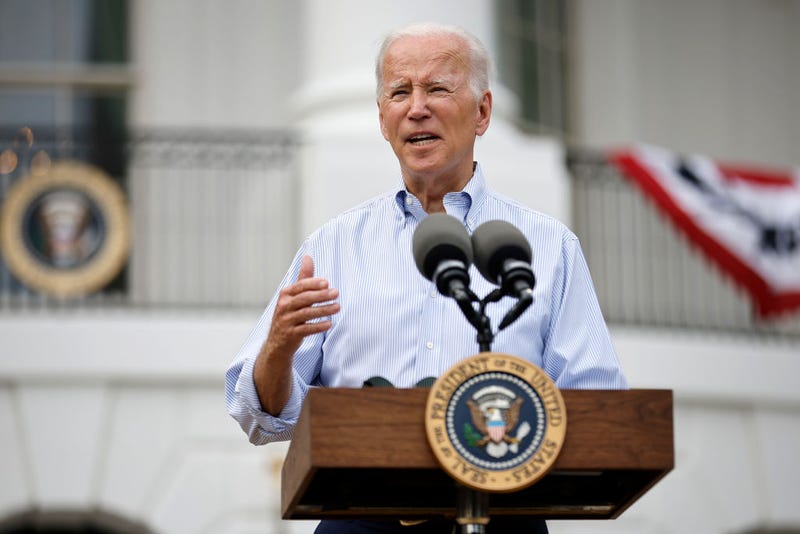
U.S. President Joe Biden may push forward his administration’s climate change agenda by declaring climate change an emergency, according to anonymous sources cited by The Washington Post.
Last week, Sen. Joe Manchin (D-W.V.) told party leaders that he would not support a large economic package. In an interview Friday, the senator said he told Senate Majority Leader Chuck Schumer that would not commit to environmental or tax measures included in the package until he saw the inflation rate for July – which should be released Aug. 10 – as well as the Federal Reserve Bank’s next expected interest rate hike.
Manchin previously blocked efforts to pass the Biden administration’s Build Back Better proposal, which included funding to help mitigate the impact of climate change.
“In the last two years, as Chairman of the Senate Energy and Natural Resources Committee and with bipartisan support, we have invested billions of dollars into clean energy technologies so we can continue to lead the world in reducing emissions through innovation,” Manchin said in a December statement regarding his opposition to the act. “But to do so at a rate that is faster than technology or the markets allow will have catastrophic consequences for the American people like we have seen in both Texas and California in the last two years.”
According to POLITICO, although Biden agreed to Manchin’s demand last week, “White House aides and Democrats were left furious over what they deemed Manchin’s latest act of sabotage,” and they blame him “for shifting the goalposts and blowing up key elements of an economic package months in the making.”
News of Manchin’s opposition came as drought impacted many parts of the U.S. and people in the U.K. dealt with record high temperatures. Earlier this month EcoWatch reported that the Great Salt Lake in Utah had reached a record low water level.
In a statement issued Friday while he was in Saudi Arabia, Biden said climate change action is more urgent than ever.
“So let me be clear: if the Senate will not move to tackle the climate crisis and strengthen our domestic clean energy industry, I will take strong executive action to meet this moment,” the president said. He added that his actions are intended to create jobs, improve energy security, bolster domestic manufacturing and supply chains and protect U.S. citizens from oil and gas price hikes in the future in addition to addressing climate change.
“I will not back down: the opportunity to create jobs and build a clean energy future is too important to relent,” Biden said.
Jared Bernstein, a top White House economic adviser, told reporters at a news briefing that Biden would “aggressively fight to attack climate change,” said The Washington Post.
“I think realistically there is a lot he can do and there is a lot he will do,” Bernstein said.
According to the Post, “two individuals with knowledge of the discussions said also they expect the president to announce a slew of additional actions aimed at curbing planet-warming emissions.”
It is not clear what the scope of the actions will be or when they might be announced.
Pew Research Center survey results released last week found that 49% of U.S. adults say the Biden administration’s policies on climate change are taking the country in the right direction, slightly more than 47% who said the administration’s climate policies are taking the country in the wrong direction.
Another Pew poll from earlier this year found that 69% of U.S. adults “prioritize developing alternative energy sources, such as wind and solar, over expanding the production of oil, coal and natural gas.”
Even with public opinion in favor of climate change mitigation efforts, the U.S. Supreme Court made a ruling this summer in the West Virginia v. EPA case that Biden said “risks damaging our nation’s ability to keep our air clean and combat climate change.”
This year Biden issued an executive order on another topic that the public and Supreme Court are at odds over: reproductive health care. While the court ruled in the Dobbs v. Jackson Women’s Health case to overturn Roe v. Wade abortion protections, most Americans oppose that decision, according to a Marist poll. Congress also failed earlier this year to codify those protections, with Manchin again voting out-of-step with his party.
According to The Guardian, Biden and Democrats hope to include environmental measures in a $1 trillion version of the $2 trillion Build Back Better bill.
“The sad truth is that America is behind where it needs to be when it comes to keeping the planet from experiencing the worst effects of rising temperatures, and even if Biden had gotten his Build Back Better plan through Congress, it wouldn’t have been enough,” said The Guardian Tuesday.
Study results published Monday in Proceedings of the National Academy of Sciences regarding global water resources further highlight the need to address climate change.
“Our results demonstrate pervasive alterations to the variability of water fluxes, water storage, and disturbance by the end of this century,” said researchers from the National Center for Atmospheric Research. “Projected warming will reduce winter snow accumulation and increase the fraction of snow that melts during winter, blurring the seasonal distinction between periods of winter snow accumulation and its subsequent melt in the spring and summer.”
Data from the Center for Sustainable Systems at the University of Michigan shows that, as of 2015, total U.S. water use was approximately 322 billion gallons per day. Authors of the recent study said their findings have “critical implications” for water resource management going forward.


